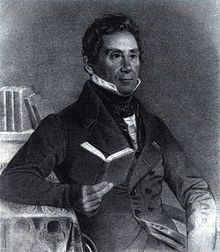
Karl Friedrich Nebenius (29 September 1784, Rhodt - 8 June 1857 in Karlsruhe) was a Baden minister and author of their 1818 constitution.

Karl Friedrich Nebenius (29 September 1784, Rhodt - 8 June 1857 in Karlsruhe) was a Baden minister and author of their 1818 constitution.
Nebenius was born on 29 September 1784 in Rhodt in the present-day state of Rhineland-Palatinate in Germany. After studying law at University of Tübingen, he held various posts in the Baden State civil service between 1807 and 1849.
He was the author of the Baden constitution of 1818, wrote the Baden law on weights and measures in 1828 and reformed the education system in the Grand Duchy. In 1832 he also carried out a comprehensive reorganisation of Polytechnic in University of Karlsruhe. The improvement of the state's infrastructure was another field in which Nebenius worked. He drove the entry of Baden into the German Customs Union (Deutscher Zollverein) in 1836, the state-financed construction of the Baden railway from Mannheim to Basel and the construction of Mannheim Harbour.
In 1838 Nebenius became Minister for the Interior (Innenminister), but had to resign in October 1839 due to differences with the conservative foreign minister, Friedrich Landolin Karl Freiherr von Blittersdorf.
Nebenius was dismissed from state service as a result of the 1848/49 Baden Revolution. Thereafter he devoted himself to literary pursuits. [1] He was a member of the Carl zur Eintracht masonic lodge in Mannheim. He died on 8 June 1857 in Karlsruhe.
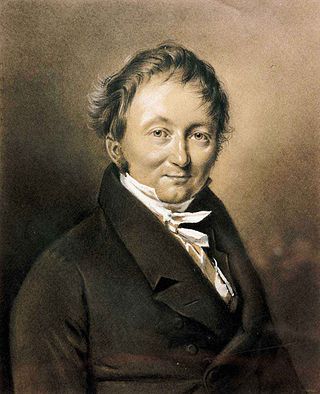
Karl Freiherr von Drais was a noble German forest official and significant inventor in the Biedermeier period. He was born and died in Karlsruhe. He is seen as "the father of the bicycle".
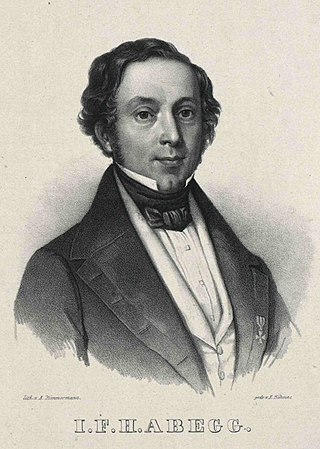
Julius Friedrich Heinrich Abegg was a German criminalist.
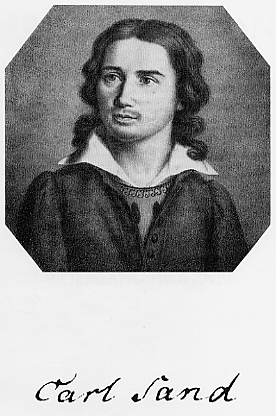
Karl Ludwig Sand was a German university student and member of a liberal Burschenschaft. He was executed in 1820 for the murder of the conservative dramatist August von Kotzebue the previous year in Mannheim. As a result of his execution, Sand became a martyr in the eyes of many German nationalists seeking the creation of a united German national state.

August Friedrich Wilhelm Crome was a German economist and statistician, and Professor of Cameralism at the University of Giessen. He is known particularly for his 1782 product map of Europe, which is considered by some as the earliest known printed economic map and thematic map.
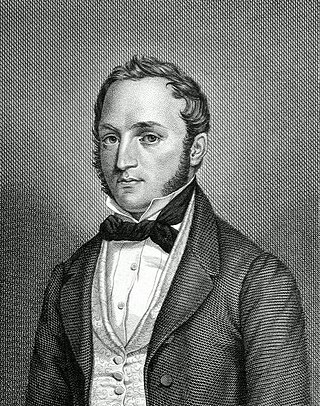
Friedrich Daniel Bassermann was a German liberal politician who is best known for calling for a pan-German Parliament at the Frankfurt Parliament. He emphasized the value of a national self-esteem based on progress and freedom.

Lorenz von Westenrieder was a well-known author and historian in Bavaria and a critic of the Elector Karl Theordor and supporter of Maximilian IV Joseph. There are several memorials to him in Munich.
The Baden Revolution of 1848/1849 was a regional uprising in the Grand Duchy of Baden which was part of the revolutionary unrest that gripped almost all of Central Europe at that time.
Johann Ludwig Klüber was a German law professor, author and state official.

The Grand Duchy of Baden, also known as the Baden Palatinate, was a state in south-west Germany on the east bank of the Rhine. It existed as a sovereign state between 1806 and 1871 and as part of the German Empire from 1871 until 1918.

Baron Friedrich Karl von Moser Filseck was a German jurist, state journalist and a politician.
Karl Joseph Obser was a German archivist and historian, largely known for his studies on the history of Baden during the 18th and early 19th century.
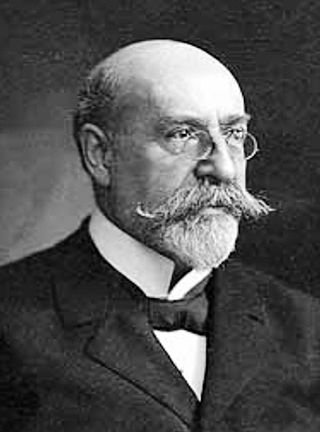
Friedrich von Weech was a German historian and archivist.

Friedrich Landolin Karl Freiherr von Blittersdorf was a long serving politician-administrator in the Grand Duchy of Baden. As a younger man he served in a succession of ambassadorial roles and undertook other diplomatic work. Between 1835 and 1844 he became a dominating force in the government. He approached his responsibilities with huge erudition and energy, combined with a powerfully conservative set of political instincts. In this respect he contrasted with his cautiously reformist predecessor as head of the government, Ludwig Georg Winter.

Anna Maria von Baden-Durlach was a German poet and painter. She was a daughter of Margrave Georg Friedrich von Baden.

Johann Georg August Wirth was a German lawyer, writer and politician during the Vormärz period that preceded the German revolutions of 1848–1849.
Franz Schnabel was a German historian. He wrote about German history, particularly the "cultural crisis" of the 19th century in Germany as well as humanism after the end of the Third Reich. He opposed Nazism during the Second World War.
Anton Stabel was a Baden lawyer, judge and statesman. For a number of years he was the Grand Duchy's senior judge. Subsequently, following a succession of ministerial appointments, he became president of the council of ministers and minister of state , serving between 1861 and 1866. He is remembered, most particularly, for a series of exemplary Judicial and Court reforms.

Carl Joseph Georg Sigismund Wächter, from 1835 von Wächter, was a leading German jurist in the 19th century. For a brief period he served as president of the Oberappellationsgericht der vier Freien Städte.
The Baden Army was the military organisation of the German state of Baden until 1871. The origins of the army were a combination of units that the Badenese margraviates of Baden-Durlach and Baden-Baden had set up in the Baroque era, and the standing army of the Swabian Circle, to which both territories had to contribute troops. The reunification of the two small states to form the Margraviate of Baden in 1771 and its subsequent enlargement and elevation by Napoleon to become the Grand Duchy of Baden in 1806 created both the opportunity and obligation to maintain a larger army, which Napoleon used in his campaigns against Austria, Prussia and Spain and, above all, Russia. After the end of Napoleon's rule, the Grand Duchy of Baden contributed a division to the German Federal Army. In 1848, Badenese troops helped to suppress the Hecker uprising, but a year later a large number sided with the Baden revolutionaries. After the violent suppression of the revolution by Prussian and Württemberg troops, the army was re-established and fought in the Austro-Prussian War of 1866 on the side of Austria and the southern German states, as well as in the Franco-Prussian War of 1870 on the side of the Germans. When Baden joined the German Empire in 1870/71, the Grand Duchy gave up its military sovereignty and the Badenese troops became part of the XIV Army Corps of the Imperial German Army.

The South German Customs Union was an attempt by various states in the German Confederation to create a unified customs area, in the early stages of German unification. After several failed attempts to bring in other states, a customs treaty was agreed between the Kingdom of Bavaria and the Kingdom of Württemberg in 1828. It was incorporated into the Prussian-led Zollverein in 1834.